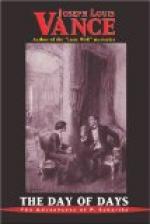Gloomily he paused with a hand on the open door of his car, thoughts profoundly disturbed and unsettled, for so long that the operator grew restless.
“Where next, sir?” he asked.
“Wait,” said P. Sybarite in a manner of abstraction that did him no injustice; and entering the car, mechanically shut the door and sat down, permitting his gaze to range absently among the dusky distances of Central Park; where through the netted, leafless branches, the lamps that march the winding pathways glimmered like a hundred tiny moons of gold lost in some vast purple well....
Should he appeal to the police? His solicitude for the girl forbade him such recourse save as a last resort. Publicity must be avoided until the time when, all else having failed, it alone held out some little promise of assistance.
But—adrift and blind upon uncharted seas of uncertainty!—what to do?
Suddenly it became plain to him that if in truth it was with her as he feared, at least two persons knew what had become of the girl—two persons aside from himself and her hired kidnappers: Brian Shaynon and Bayard, his son.
From them alone authoritative information might be extracted, by ruse or wile or downright intimidation, eked out with effrontery, a stout heart, and perhaps a little luck.
A baleful light informing his eyes, an ominous expression settling about his mouth, he gave the operator the address of Shaynon’s town-house; and as the car slipped away from the hotel was sensible of keen regret that he had left at Peter Kenny’s, what time he changed his clothing, the pistol given him by Mrs. Jefferson Inche, together with the greater part of his fortuitous fortune—neither firearms nor large amounts of money seeming polite additions to one’s costume for a dance....
In five minutes the car drew up in front of one of those few old-fashioned, brownstone, English-basement residences which to-day survive on Fifth Avenue below Fifty-ninth Street, elbowed, shouldered, and frowned down upon by beetling hives of trade.
At all of its wide, old-style windows, ruffled shades of straw-coloured silk were drawn. One sign alone held out any promise that all within were not deep in slumber: the outer front doors were not closed. Upon the frosted glass panels of the inner doors a dim light cast a sickly yellow stain.
Laying hold of an obsolete bell-pull, P. Sybarite yanked it with a spirit in tune with his temper. Immediately, and considerably to his surprise, the doors were thrown open and on the threshold a butler showed him a face of age, grey with the strain of a sleepless night, and drawn and set with bleary eyes.
“Mr. Shaynon?” the little man demanded sharply.
“W’ich Mr. Shaynon, sir?” enquired the butler, too weary to betray surprise—did he feel any—at this ill-timed call.
“Either—I don’t care which.”
“Mr. Bayard Shaynon ’as just left—not five minutes ago, sir.”




